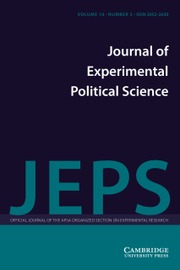-
- You have access: full
- Open access
- ISSN: 2052-2630 (Print), 2052-2649 (Online)
- Editors: Scott Clifford Texas A&M University, USA, and Jennifer Jerit Dartmouth College, USA
- Editorial board
We invite authors to submit concise articles (around 4000 words or fewer) that immediately address the subject of the research. We do not require lengthy explanations regarding and justifications of the experimental method. Nor do we expect extensive literature reviews of pros and cons of the methodological approaches involved in the experiment unless the goal of the article is to explore these methodological issues. We will consider longer articles in rare, but appropriate cases, as in the following examples: when a new experimental method or approach is being introduced and discussed or when novel theoretical results are being evaluated through experimentation. Finally, we encourage authors to submit manuscripts that showcase informative null findings or inconsistent results from well-designed, executed, and analyzed experiments.
The journal publishes four type of articles: 1) Research Articles (4000 words) that report novel empirical findings grounded in social science theory; 2) Short Reports (1000 words) concisely summarize empirical findings that primarily inform best practices, measurement strategies, or innovations in experimental design; 3) Replications (3000 words) of previous experiments; and 4) Meta-Analyses (3000 words) of a well-defined set of experiments.
Latest articles
JEPS blog
-
Populism and Candidate Support in the US: The Effects of “Thin” and “Host” Ideology
- 20 November 2022,
- Bruno Castanho Silva, Fabian G. Neuner, and Christopher Wratil As populists celebrate electoral successes across the globe, researchers have been debating what...
-
Discriminatory Immigration Bans Elicit Anti-Americanism in Targeted Communities: Evidence from Nigerian Expatriates
- 21 February 2022,
- Aaron Erlich, Thomas Soehl, and Annie Y. Chen Restrictions on immigration are nearly universal in two ways. First, they are universal because every country...




Tweets by JEPS